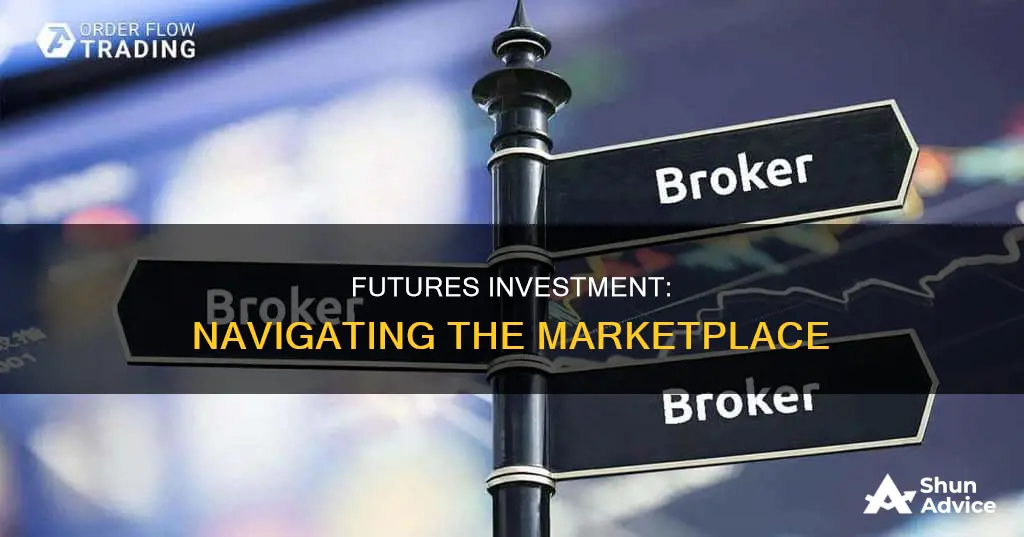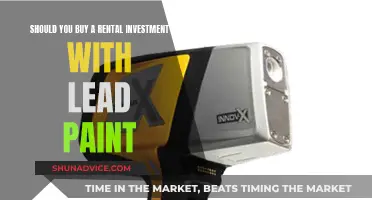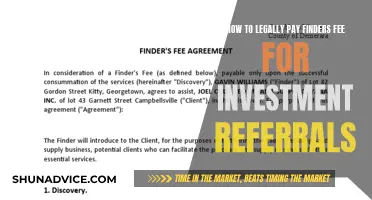
Futures trading is a way to speculate on or hedge against the future value of assets, including stocks, bonds, and commodities. Futures are contracts to buy or sell a specific asset at a future date. They are typically traded on a stock exchange, with the underlying asset being a commodity, a security, or another financial instrument. Futures trading commonly refers to futures with underlying assets in the stock market, but they can also be based on physical commodities, bonds, or weather events.
| Characteristics | Values |
|---|---|
| What are futures? | Derivative contracts to buy or sell an asset at a future date at an agreed-upon price |
| Who is it for? | Investors, speculators, companies that want to take physical delivery of the commodity or supply it |
| What can you buy futures in? | Commodities (e.g. coffee, oil, corn, gold), stock indexes (e.g. S&P 500), cryptocurrencies (e.g. Bitcoin), bonds |
| Advantages | High leverage, portfolio diversification, liquidity, greater potential for leverage than owning securities directly |
| Disadvantages | High risk, margin and leverage rules are more liberal than in securities trading, sensitivity to price fluctuations, expiration dates |
| How to start trading futures | Open an account with a broker that supports the markets you want to trade |
What You'll Learn

Where to buy futures in commodities
Commodity futures are contracts to buy or sell a specific amount of a commodity at a certain price on a designated date. Trading commodity futures lets you bet on the price of commodities, including gold, corn, oil, and natural gas.
Commodities are typically sorted into four broad categories: metal, energy, livestock and meat, and agricultural products.
There are several ways to invest in commodities, including:
- Futures contracts: A futures contract is a legal agreement to buy or sell a particular commodity at a predetermined price at a specified time. Futures contracts are available for every kind of commodity. Generally speaking, two types of investors engage in the futures markets for commodities: commercial or institutional users of the commodities and speculative investors.
- Physical commodity purchases: Individual investors can take possession of physical commodities such as gold bars, coins, or jewelry. However, transaction costs are higher for these types of purchases.
- Commodity stocks: You can also buy the stock of a company involved with a commodity. For example, you could invest in an oil drilling company or a grain agriculture business.
- Commodity ETFs, mutual funds, and ETNs: These funds combine the money from many small investors to build a large portfolio that tries to track the price of a commodity or a basket of commodities.
- Commodity pools and managed futures: Commodity pools and managed futures are private funds that can invest in commodities. They are like mutual funds, but many of them are not publicly traded, so you need to be approved to buy into the fund.
Before investing in commodity futures, it is important to understand the risks involved. Commodity futures can be very risky, especially for inexperienced investors. The markets can be volatile, and you could lose your initial deposit and more before you have time to close your position. It is also important to consider your financial experience, goals, and resources, and know how much you can afford to lose.
Theranos: Why Investors Bought the Lie
You may want to see also

Where to buy futures in stocks
Futures are a useful trading vehicle available to all traders across many asset classes. They are highly leveraged, meaning that only a small percentage of the total value of positions is required to be posted as margin. This means that futures trading can lead to large profits and losses relative to the capital required to establish and maintain a position.
If you're looking to buy futures in stocks, you'll need to open a futures trading account with a broker that supports futures markets. Here are some of the best online brokers for trading futures:
Interactive Brokers
Interactive Brokers (IBKR) is the top choice for professional, advanced, and international traders. The company offers more markets to trade through a single platform than any other broker. IBKR also has sophisticated trading technology, including the ability to backtest trading ideas and develop trading algorithms. The platform caters to large professional traders with higher margin requirements than other brokers.
NinjaTrader
NinjaTrader is a good choice for dedicated futures traders, offering multiple low-cost pricing options, low margin rates, and access to strong desktop, web, and mobile platforms. The platform also supports trading directly from customisable charts and has excellent, customisable charting and real-time analysis.
E*TRADE
E*TRADE is a good option for those seeking education and support in futures trading. The platform offers extensive content and training resources to help educate and prepare investors, including solid content specific to futures trading. E*TRADE also supports multiple U.S. asset classes and has easy-to-use platforms.
TradeStation
TradeStation is a top choice for desktop futures traders, offering excellent tools for charting, order entry, and position management, along with reasonable margin rates. The platform is designed for more advanced traders and can take some time to learn, but it is reasonably intuitive for those with experience. TradeStation also supports trading in multiple asset classes, such as stocks, ETFs, cryptocurrencies, options, and futures.
When choosing a broker for futures trading, it's important to consider factors such as contract fees, trading platforms, real-time data and quotes, charting and screening tools, technical indicators, research, customer support, and costs. It's also crucial to understand the risks involved in futures trading and ensure you have sufficient capital to cover potential losses.
Wholesale Investment Wisdom: Uncovering the Fine Print for Savvy Decisions
You may want to see also

Where to buy futures in cryptocurrencies
Cryptocurrency futures are contracts between two investors who bet on the future price of a cryptocurrency, without actually purchasing it. Crypto futures are similar to standard futures contracts, as they allow investors to bet on the price trajectory of an underlying asset.
Where to Trade Cryptocurrency Futures
Cryptocurrency futures can be traded on brokerages approved for futures and options trading. These include:
- Chicago Mercantile Exchange (CME)
- Chicago Board Options Exchange (CBOE)
- Forex.com
- TD Ameritrade
- Interactive Brokers
- Tradovate
- Kraken
- Binance
- Bybit
- MEXC
- OKX
- Bitget
- Bitfinex
- BitMEX
- Deribit
- Delta Exchange
Things to Consider
When choosing a platform to trade cryptocurrency futures, it is important to consider the fees, leverage options, and range of cryptocurrencies offered. It is also worth noting that most exchanges are unregulated, which can increase the risk of trading cryptocurrency futures.
Car Conundrum: Unraveling the Myth of Auto Investments
You may want to see also

Where to buy futures in bonds
Bond futures are financial derivatives that allow the holder to buy or sell bonds on a specified date at a predetermined price. They are traded on futures exchange markets and are bought and sold through brokerage firms that offer futures trading.
Bond futures are used for speculation on the price of a bond or to protect bond holdings. They are also used to indirectly trade or hedge interest rate moves. For example, a fund manager holding long-term US Treasury bonds may sell Treasury bond futures contracts to lock in prices in case interest rates rise. If interest rates rise as expected, the fund manager's Treasury portfolio will fall in value, but the gains in their short futures position will offset the loss.
In the US, bond futures are traded primarily on the Chicago Board of Trade (CBOT), which is part of the Chicago Mercantile Exchange (CME) Group. The CME offers futures on Treasury bonds and notes with maturities of 2, 5, 10, and 30 years. The CBOT US Treasury futures contracts typically expire quarterly in March, June, September, and December.
Examples of underlying assets for bond futures include:
- 13-week Treasury bills (T-bills)
- 2-, 3-, 5-, and 10-year Treasury notes (T-notes)
- Classic and Ultra Treasury bonds (T-bonds)
Several brokers offer bond futures, including Charles Schwab/TD Ameritrade, Interactive Brokers, and TradeStation.
Infosys: Invest Now or Miss Out?
You may want to see also

Where to buy futures in ETFs
Futures and ETFs are two of the most commonly traded assets across the globe. While they are often compared, many investors prefer trading futures due to the absence of a management fee, 24/6 trading, and better liquidity.
If you're looking to buy futures in ETFs, you can refer to the list below, which includes some of the major futures-based ETFs traded in the USA:
- Invesco Optimum Yield Diversified Commodity Strategy No K-1 ETF
- First Trust Global Tactical Commodity Strategy Fund
- Invesco DB Commodity Index Tracking Fund
- United States Oil Fund LP
- IShares S&P GSCI Commodity-Indexed Trust
- Abrdn Bloomberg All Commodity Strategy K-1 Free ETF
- Invesco DB Agriculture Fund
- United States Natural Gas Fund LP
- ProShares Ultra Silver
- ProShares Ultra Bloomberg Natural Gas
- ProShares Ultra Bloomberg Crude Oil
- IPath Bloomberg Commodity Index Total Return ETN
- KraneShares Global Carbon Strategy ETF
- PIMCO Commodity Strategy Active Exchange-Traded Fund
- Direxion Auspice Broad Commodity Strategy ETF
- IShares Bloomberg Roll Select Commodity Strategy ETF
- Neuberger Berman Commodity Strategy ETF
- Abrdn Bloomberg All Commodity Longer Dated Strategy K-1 Free ETF
- United States Copper Index Fund
- ProShares Ultra Gold
- Harbor Commodity All-Weather Strategy ETF
- KraneShares California Carbon Allowance Strategy ETF
- United States Commodity Index Fund
- ProShares UltraShort Bloomberg Crude Oil
Other Considerations
It's important to note that investing in futures contracts comes with its own set of risks and considerations. For example, futures contracts are highly volatile and may not be suitable for all investors. Additionally, while futures offer more control over investments, they also carry a higher risk of loss compared to ETFs.
Smart Ways to Invest $2,500 Today
You may want to see also







